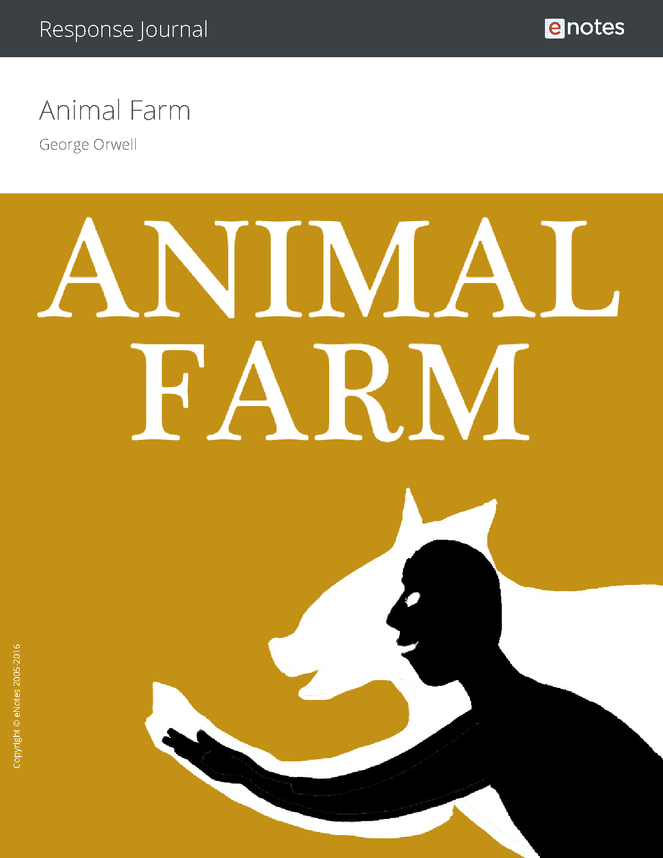Animal Farm Journal Prompts
Do you struggle to find interesting writing prompts for your students? Are you looking for ways to engage them in critical thinking about important themes in literature? Consider incorporating animal farm journal prompts into your curriculum. These prompts are designed to encourage students to reflect on the themes, characters, and events in George Orwell's classic novel, while also honing their writing skills. In this article, we will look at the benefits of using animal farm journal prompts in your classroom, and offer some tips for getting started.
Why Animal Farm Journal Prompts?
Animal Farm is a powerful work of political satire that has resonated with readers for decades. The story of a group of farm animals who overthrow their human owner and establish a socialist utopia, only to have it devolve into a tyranny of its own, is both timeless and timely. By using animal farm journal prompts, you can help your students explore themes such as power, corruption, propaganda, and the nature of revolution. Additionally, journaling is an excellent way to develop critical thinking and writing skills, while also encouraging self-reflection and expression.
How to Use Animal Farm Journal Prompts
To get started with animal farm journal prompts, you can simply assign a prompt to your students and ask them to respond in writing. However, to get the most out of this activity, it's important to provide some context and guidance. Begin by introducing the novel and its themes, and give your students some background on the historical and political context in which it was written. Then, provide a list of prompts that cover different aspects of the novel, such as characterization, symbolism, and themes. You can encourage students to choose the prompts that interest them the most, or assign specific prompts based on your learning objectives.
The Benefits of Animal Farm Journal Prompts
Animal farm journal prompts offer a range of benefits for both you and your students. For students, journaling can help them develop their writing skills, build their vocabulary, and improve their critical thinking. Additionally, by engaging with the themes and characters in Animal Farm, students can gain a deeper understanding of the novel and its historical context, while also developing empathy and perspective-taking skills. From a teacher's perspective, using animal farm journal prompts can be an efficient and effective way to assess and track student progress. By reviewing students' journal entries, you can gain insight into their thought processes, identify areas of confusion or misunderstanding, and provide targeted feedback.
Personal Experience with Animal Farm Journal Prompts
When I first started using animal farm journal prompts in my classroom, I was amazed at the depth and complexity of the responses I received from my students. One of my favorite prompts asked students to imagine themselves as one of the animals on the farm, and to reflect on how their experience would be different depending on their role. I was blown away by the creativity and insight that my students showed in their responses. Not only did they demonstrate a deep understanding of the novel, but they also revealed their own perspectives on power, leadership, and social justice.
Tips for Using Animal Farm Journal Prompts
If you're thinking about incorporating animal farm journal prompts into your classroom, here are some tips to keep in mind:
- Provide some context and background on the novel and its themes before assigning prompts.
- Offer a variety of prompts that cover different aspects of the novel.
- Encourage students to choose prompts that resonate with them, but also assign specific prompts based on learning objectives.
- Read and respond to student entries regularly, and offer targeted feedback.
- Use student journal entries as a tool for assessment and tracking progress.
Using Animal Farm Journal Prompts in Virtual Learning
With the rise of virtual learning due to COVID-19, animal farm journal prompts can be an excellent tool to engage students in critical thinking from home. Teachers can assign prompts via email or a learning management system, and students can respond in writing or via video. This activity can also be adapted for synchronous virtual classes, with students sharing their responses in real-time.
Making Animal Farm Journal Prompts Accessible for All Students
It's important to remember that not all students learn or express themselves in the same way. To make animal farm journal prompts accessible for all students, consider offering alternative options for students who may struggle with writing. For example:
- Allow students to respond to prompts verbally, either in class or through a recorded message.
- Offer visual prompts that ask students to create a drawing or graphic representation of a scene or character from the novel.
- Encourage students to collaborate on responses, either in pairs or small groups.
Question and Answer
Here are some common questions and answers related to animal farm journal prompts:
Q: What is the purpose of animal farm journal prompts?
A: The purpose of animal farm journal prompts is to encourage students to engage with the themes, characters, and events in George Orwell's Animal Farm, while also honing their critical thinking and writing skills.
Q: What are some examples of animal farm journal prompts?
A: Examples of animal farm journal prompts might include: "In what ways is Napoleon's leadership style similar to or different from that of Mr. Jones?" or "What does the character of Boxer represent in the novel, and how does his fate illustrate one of the novel's themes?"
Q: How can animal farm journal prompts be adapted for virtual learning?
A: Animal farm journal prompts can be adapted for virtual learning by assigning prompts via email or a learning management system, and allowing students to respond in writing or via video. They can also be used in synchronous virtual classes, with students sharing their responses in real-time.
Q: How can I assess student responses to animal farm journal prompts?
A: You can assess student responses to animal farm journal prompts by reading and responding to entries regularly, and offering targeted feedback. You can also use student journal entries as a tool for assessment and tracking progress.
Conclusion
Animal farm journal prompts are a valuable tool for engaging students in critical thinking and writing, while also exploring important themes in literature. By providing students with prompts that are designed to stimulate reflection and analysis, you can help them develop their skills and gain a deeper understanding of the novel and its impact. Whether you're teaching in a traditional classroom or a virtual one, animal farm journal prompts offer a flexible and effective way to enhance your curriculum and engage your students.
Gallery
Animal Farm: Study Prompts | Teaching Resources

Photo Credit by: bing.com /
Animal Farm Text Guide - ATAR Notes Text Guides - Free Shipping On

Photo Credit by: bing.com /
🚜 FREE Printable Farm Writing Prompts For Kids

Photo Credit by: bing.com /
Animal Farm ENotes Response Journal - An ENotes... - Activities

Photo Credit by: bing.com / farm animal enotes response journal
Animal Farm Journal Prompts By MissHartsLanguageArts | TpT

Photo Credit by: bing.com /